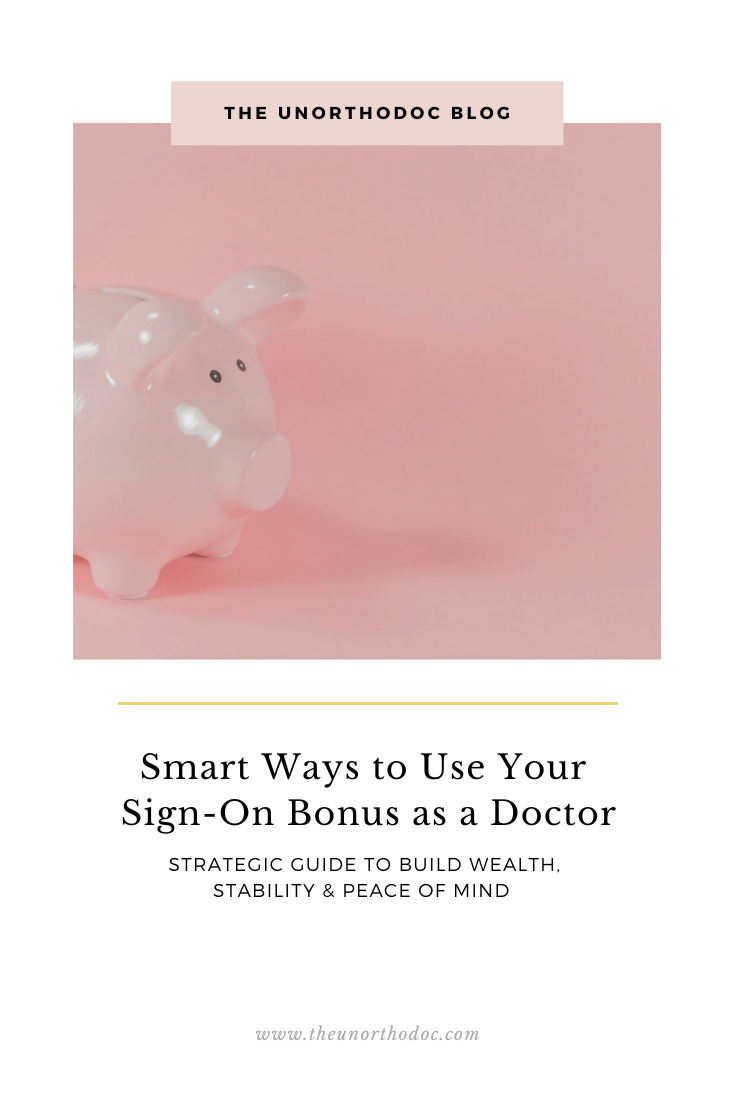Smart Ways to Use Your Sign-On Bonus as a Doctor: A Strategic Guide to Build Wealth, Stability, and Peace of Mind
Every year when schools and residency programs graduate a cohort of doctors, without fail I get some questions - one of which is, “what do I do with my sign on bonus?”
Here’s how doctors, dentists, and healthcare professionals can wisely use their sign-on bonus to set a strong financial foundation and avoid common pitfalls.
When doctors, dentists, and healthcare professionals begin new positions (especially in hospitals, corporate dental chains, or large medical organizations) it’s common to receive a sign-on bonus. These bonuses are enticing, often ranging from a few thousand dollars to well into five figures.
But, what you do with your sign-on bonus can either set you up for long-term success or trap you in a cycle of financial instability and lifestyle inflation.
So let’s talk strategy. Before the bonus hits your account (or burns a hole in your pocket), here’s how to be intentional about using it.
1. Understand the Tax Implications First
Before you even start allocating, it’s important to understand that your sign-on bonus is taxed as income. This means the number you’re quoted is not the number you’ll actually receive.
Quick tip:
Set aside 25–35% for taxes, especially if the bonus bumps you into a higher tax bracket. If your employer doesn’t withhold enough, you could face an unpleasant surprise come tax season.
2. Pay Down High-Interest Debt
If you have any high-interest credit card debt, personal loans, or lingering consumer debt, this should be your first target.
Why?
Eliminating 18–25% interest rates is the equivalent of getting that same return on your investment—risk-free.
Student loans?
If they’re federal with low interest and currently on income-driven repayment, they may not be your top priority, but you can still consider making a lump sum payment if your bonus is substantial.
3. Start or Build an Emergency Fund
One of the biggest stress relievers in any career—especially healthcare—is knowing that you’re covered if something unexpected happens.
Aim for:
3–6 months of expenses in a high-yield savings account.
Why it matters:
Emergency funds protect you from unexpected job changes, illness, relocation costs, or surprise expenses without going into debt.
4. Max Out or Jumpstart Retirement Accounts
Use your bonus to contribute to your:
Roth IRA (if eligible)
Traditional IRA
401(k) or 403(b) (if your plan allows after-tax contributions or catch-ups)
Even if your employer already contributes to a retirement plan, your own contributions are what move the needle on long-term wealth.
5. Invest in Yourself and Your Career
Are there certifications, coaching, courses, or licenses that will help you command a higher salary or grow in your specialty?
Examples include:
Board certification prep courses
Dental CE (continuing education)
Medical or business coaching
Public speaking or leadership programs
MBA or MHA programs if you’re pursuing admin or ownership paths
This is the kind of investment that has a long-term return—especially if you’re planning for ownership, private practice, or leadership.
6. Use It as Seed Money for a Side Hustle or Business
If you’ve been considering building a personal brand, starting a blog or podcast, launching a product, or even opening a practice or wellness brand—your sign-on bonus can be your startup capital.
Examples include:
Paying for a website or brand designer
Purchasing inventory for a small product line
Hiring a business coach
Registering your LLC or trademark
This is especially powerful for healthcare professionals seeking multiple income streams or exit strategies.
7. Put a Portion Toward a Big Goal
Once the essentials are covered, you can give yourself permission to enjoy a portion of your bonus guilt-free.
Ideas:
Save for a home down payment
Fund fertility treatments
Plan a bucket list vacation
Help family or give to charity
Start a 529 plan for your child
Even allocating 10–20% for something meaningful can make your bonus feel impactful and intentional.
8. Avoid the Trap of Lifestyle Inflation
It’s tempting to immediately upgrade your car, move into a luxury apartment, or finance expensive gadgets. But that’s how many doctors and dentists end up living paycheck to paycheck—despite a high income.
Instead, let your bonus be the buffer between you and stress. The goal isn’t just to enjoy today, but to create peace of mind for years to come.
9. Bonus Tip: Read the Fine Print
Some bonuses come with strings attached. For example, if you leave before a certain time (often 12–36 months), you may need to pay part or all of it back.
Be sure you understand:
The vesting period
Whether it’s a loan disguised as a bonus
What happens if you’re terminated or resign early
This is important especially if you're considering switching to private practice or entrepreneurship soon.
A sign-on bonus is a gift, but also a responsibility. With intentionality, it can help you:
Build a financial foundation
Relieve pressure
Start investing
Create multiple income streams
Buy back time and peace of mind
You worked hard for your degree, your license, and your position. Now it’s time to make your money work hard for you.
Recommended Reading:
1. "The White Coat Investor: A Doctor’s Guide to Personal Finance and Investing" by Dr. Jim Dahle
This book is a foundational read for any physician looking to gain control over their finances, especially early in their career. It covers student loans, budgeting, insurance, and investing.
2. "The Physician Philosopher’s Guide to Personal Finance" by Dr. James D. Turner
Another great resource that dives deep into wealth-building strategies for new attendings, residents, and fellows.
3. The White Coat Investor Blog & Podcast
Their site is full of in-depth blog posts and free tools that break down topics like what to do with windfalls, bonuses, and how to manage debt efficiently.
4. Physician on FIRE Blog
A financial independence blog created by an anesthesiologist, offering advice on smart spending, investing, and early retirement planning.
6. Bogleheads Wiki: Windfall Management
A concise, objective breakdown of what to do when you receive a large sum of money — including bonuses.













